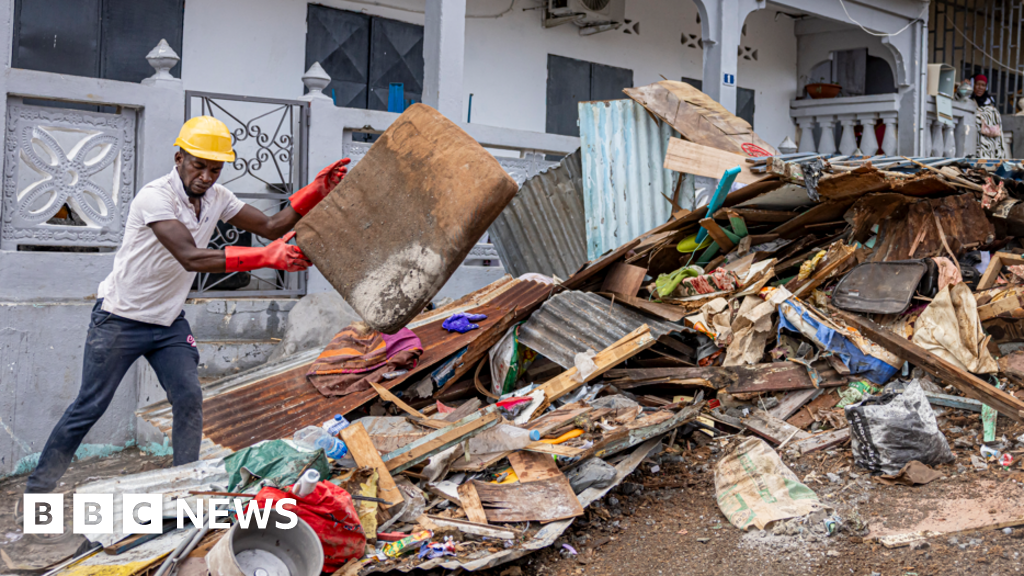In the series premiere of NBC’s hospital-set comedy St. Denis Medical, a woman with a vague complaint of leg pain lays into the eponymous medical facility’s harried intake nurse, who has been distracted from helping her by a swarm of frantic patients and a computer-network crash. “I’m gonna give you a number for the person who can help you,” says Val (Superstore alum Kaliko Kauahi), the nurse, handing over a Post-it note. “That’s the White House. Ask for Joe. Tell him there’s a nursing shortage and we need him to fix the health care system.”
If you chuckled at that joke, as I did, then you’re probably going to enjoy St. Denis, which will make its two-episode debut on Nov. 12. There are way too many medical shows on TV right now—without doctors, lawyers, and cops, broadcast prime-time would basically be sports and singing competitions—but this one feels unique among them, and not just because it’s a comedy. A mockumentary in the tradition of Abbott Elementary and Parks and Recreation, set within a beleaguered public institution populated (mostly) by committed employees, it also has the sly political insight of co-creator Justin Spitzer’s big-box store sitcom Superstore. And it’s promising enough to earn those comparisons. If the rest of the season is as strong as the six episodes I was able to screen, St. Denis could be the best network comedy since Abbott.
 Josh Lawson, left, and David Alan Grier in St. Denis MedicalRon Batzdorff—NBC
Josh Lawson, left, and David Alan Grier in St. Denis MedicalRon Batzdorff—NBCHeadquartered in the small-town Oregon hospital’s emergency room, the series feels solidly constructed from the beginning—in part because, by all appearances, Spitzer and his fellow creator, Eric Ledgin, gleaned many good casting and character ideas from its best antecedents. Allison Tolman, a wonderful actor who’s bounced around between short-lived gigs (Downward Dog, Emergence, Why Women Kill, the first season of Fargo) without finding the long-term role she deserves, stars as Alex, an obsessively devoted, control-freak RN who’s just been promoted to supervisor. (See also: Parks and Rec’s Leslie Knope, Abbott’s Janine Teagues.) Her foil, Ron (comedy eminence David Alan Grier), is a burned-out veteran physician whose gruff facade conceals both kindness and loneliness; think Ron Swanson meets Raymond Holt from Brooklyn Nine-Nine. Their boss, the hospital’s cluelessly ambitious executive director, Joyce (Wendi McLendon-Covey from The Goldbergs) gives off light Michael Scott vibes.
But Spitzer and Ledgin (who serves as showrunner) also use their relatively large ensemble as a chance to craft characters cleverly tailored to the hospital setting. Jury Duty’s Mekki Leeper brings comic relief as Matt, an inept, fresh-out-of-school nurse from a bizarre religious background. Assigned the straightforward task of administering an EpiPen, he accidentally sticks himself with the syringe and hulks out on epinephrine. Matt instantly develops a crush on a more senior nurse, the wry Serena (Kahyun Kim), whose initial read on her new charge is: “He dumb.” The most inspired character of all is Bruce (Josh Lawson, who also appeared in Superstore), a handsome trauma surgeon who plays to the documentary cameras. Seizing an opportunity to talk about his COVID-19 experience, he reminisces: “We were at war. Colleagues became brothers.” Bruce is a pure product of the pop-cultural mythology that surrounds doctors; he clearly watches every medical drama where guys like him are heroes and believes the hype.
 Mekki Leeper and Kaliko Kauahi in St. Denis MedicalCasey Durkin—NBC
Mekki Leeper and Kaliko Kauahi in St. Denis MedicalCasey Durkin—NBCWhile Ron grumbles and Joyce ignores the basic problems facing her overworked, underpaid staff in a quixotic quest to transform her safety-net hospital into a “destination medical facility,” the show’s real villain is a broken health care system. Underfunded and thus understaffed (which is why it’s so outrageous when Joyce invests $300k in a cutting-edge mammography machine in hopes of attracting out-of-state patients), St. Denis only works as well as it does because of employees like Alex, who sacrifice their personal lives for a job that doesn’t love them back. (“You want gratitude?” jaded Val sneers at Matt when a patient fails to thank him for life-saving care. “You’re in the wrong business. Drive an ice cream truck. Sell some weed.”) Regardless of their best efforts, the stakes are so high and the gap between resources and needs so vast that the hospital makes potentially lethal mistakes. The woman Val shrugs off in the premiere turns out to have a blood clot in her leg. She almost dies of a pulmonary embolism.
I think of comedies like St. Denis, Parks and Rec, and Abbott as systems sitcoms, in the same tradition of politicized fiction as the wave of systems novels that emerged decades ago, by authors like Don DeLillo and Thomas Pynchon. These shows take a scalpel to the absurdities and ironies and contradictions inherent in the systems we’re supposed to be able to trust, from education to local government. And if this type of storytelling seems more popular now than it’s ever been before, well, that in itself probably says something about the state of our institutions.
 Wendi Mclendon Covey in St. Denis MedicalRon Batzdorff—NBC
Wendi Mclendon Covey in St. Denis MedicalRon Batzdorff—NBCOf course, sitcoms—especially the ones designed to be widely appealing enough for broadcast TV—must also balance social commentary with not just humor, but likable characters and a constant stream of mostly lighthearted jokes. Once in a while, Spitzer and Ledgin let the pendulum swing too far in one direction. An episode that follows Alex’s attempt to split up a team of nurses who call themselves “the Filipino mafia,” for the sake of “intersectionality and inclusivity,” feels pointless. But it’s the only clunker of the initial bunch. More typical is the tight, thoughtful yet funny episode that spins the question of whether the staff should accommodate a religious patient’s onerous demands into riffs on superstition, astrology, and the purposes faith might serve in the ER.
The true test of St. Denis Medical will come a couple dozen episodes in, when broad characters like Matt as well as familiar conflicts like Alex’s work-life imbalance start to get old. At that point, the agility with which the show tackles specific aspects of the health care crisis is going to be crucial; Abbott proved its longevity by taking on charter schools in Season 2, while Superstore, in its final season, rose to the unprecedented occasion of the pandemic. Until then, the prospect of another comedy on the level of those predecessors should be enough to keep us watching.

 1 month ago
9
1 month ago
9









 English (US) ·
English (US) ·